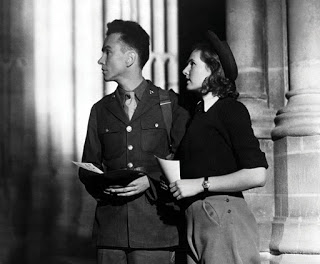An English “Masterpiece”
June 28, 2018

AT THE terrific blog A Clerk of Oxford, Eleanor Parker, Lecturer in Medieval English Literature at Brasenose College, Oxford, reviews the 1944 British film, A Canterbury Tale, which is set in wartime Kent and can be viewed online here:
Love draws forth love, and I’m sure that one reason people love this film so dearly is that it’s transparently born of love – particularly love for the countryside and the people of the director’s own childhood home (Michael Powell was born in Bekesbourne and went to school in Canterbury, and several of the minor characters are directly based on, or played by, local villagers he knew). It’s a film about love, of various kinds: love of home and nature, a poignant love for the lost and the absent, and a love of history which manifests itself in an intensely romantic, almost mystical sense of longing and connection with the past. In fact, the whole plot of the film is driven (this is a little bit of a spoiler!) by one character’s desire to share his love of history with others. He goes about it in an obsessive and bizarrely coercive way, but the film argues – and itself superbly demonstrates – that the same goal can be achieved by wooing your audience, rather than bullying them: instead of frightening them or chastising them, invite people in to love what you love. There’s no love story in this film – one of the things it was criticised for – but the whole thing is a meditation on love and desire in a way few overtly romantic stories manage to be. Its central metaphor is pilgrimage, specifically medieval pilgrimage; and for medieval writers pilgrimage was above all the journey of the questing heart, the outward embodiment of the soul’s restless, yearning desire to love and seek after truth.
